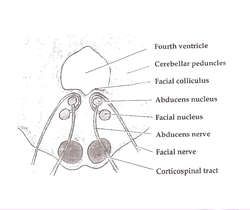Foville's syndrome

Editor-In-Chief: Prab R Tumpati, MD
Obesity, Sleep & Internal medicine
Founder, WikiMD Wellnesspedia &
W8MD's medical weight loss NYC, sleep center NYC
Philadelphia medical weight loss and Philadelphia sleep clinics
| Foville's syndrome | |
|---|---|

| |
| Synonyms | Pontine syndrome |
| Pronounce | N/A |
| Specialty | Neurology |
| Symptoms | Contralateral hemiplegia, ipsilateral facial paralysis, conjugate gaze palsy |
| Complications | N/A |
| Onset | N/A |
| Duration | N/A |
| Types | N/A |
| Causes | Stroke, tumor, multiple sclerosis |
| Risks | N/A |
| Diagnosis | Clinical diagnosis, MRI, CT scan |
| Differential diagnosis | N/A |
| Prevention | N/A |
| Treatment | Physical therapy, occupational therapy, speech therapy, medications |
| Medication | N/A |
| Prognosis | Varies depending on cause and severity |
| Frequency | Rare |
| Deaths | N/A |
Foville's Syndrome' is a rare neurological disorder characterized by a constellation of symptoms resulting from a lesion in the pons, a part of the brainstem. This condition is named after Achille-Louis-François Foville, a French physician who first described it in the 19th century. Foville's Syndrome is associated with a range of symptoms due to the involvement of the cranial nerves and the corticospinal tract within the pons.
Symptoms[edit]
The clinical presentation of Foville's Syndrome can vary but typically includes:
- Facial paralysis or weakness on the same side as the lesion (ipsilateral)
- Horizontal gaze palsy, meaning the patient cannot look towards the side of the lesion
- Diplopia or double vision
- Dysphagia or difficulty swallowing
- Hemiplegia or weakness on the opposite side of the body (contralateral) due to the involvement of the corticospinal tract
Causes[edit]
Foville's Syndrome is most commonly caused by a stroke, specifically an ischemic stroke or hemorrhage in the pons. Other causes may include:
- Brain tumors
- Multiple sclerosis
- Traumatic brain injury
- Infections affecting the brain
Diagnosis[edit]
Diagnosis of Foville's Syndrome involves a thorough clinical examination and imaging studies. Magnetic resonance imaging (MRI) of the brain is the most sensitive test for identifying the exact location and cause of the lesion in the pons.
Treatment[edit]
Treatment of Foville's Syndrome focuses on addressing the underlying cause and managing symptoms. This may include:
- Anticoagulants or antiplatelet agents for strokes
- Corticosteroids or other treatments for multiple sclerosis
- Surgery or radiation for brain tumors
- Rehabilitation therapies, including physical therapy, occupational therapy, and speech therapy, to improve mobility and function
Prognosis[edit]
The prognosis for individuals with Foville's Syndrome varies depending on the cause and severity of the brain lesion. Early diagnosis and treatment can improve outcomes, but some patients may experience long-term neurological deficits.
See Also[edit]
Ad. Transform your life with W8MD's Budget GLP-1 injections from $75


W8MD offers a medical weight loss program to lose weight in Philadelphia. Our physician-supervised medical weight loss provides:
- Weight loss injections in NYC (generic and brand names):
- Zepbound / Mounjaro, Wegovy / Ozempic, Saxenda
- Most insurances accepted or discounted self-pay rates. We will obtain insurance prior authorizations if needed.
- Generic GLP1 weight loss injections from $75 for the starting dose.
- Also offer prescription weight loss medications including Phentermine, Qsymia, Diethylpropion, Contrave etc.
NYC weight loss doctor appointmentsNYC weight loss doctor appointments
Start your NYC weight loss journey today at our NYC medical weight loss and Philadelphia medical weight loss clinics.
- Call 718-946-5500 to lose weight in NYC or for medical weight loss in Philadelphia 215-676-2334.
- Tags:NYC medical weight loss, Philadelphia lose weight Zepbound NYC, Budget GLP1 weight loss injections, Wegovy Philadelphia, Wegovy NYC, Philadelphia medical weight loss, Brookly weight loss and Wegovy NYC
|
WikiMD's Wellness Encyclopedia |
| Let Food Be Thy Medicine Medicine Thy Food - Hippocrates |
Medical Disclaimer: WikiMD is not a substitute for professional medical advice. The information on WikiMD is provided as an information resource only, may be incorrect, outdated or misleading, and is not to be used or relied on for any diagnostic or treatment purposes. Please consult your health care provider before making any healthcare decisions or for guidance about a specific medical condition. WikiMD expressly disclaims responsibility, and shall have no liability, for any damages, loss, injury, or liability whatsoever suffered as a result of your reliance on the information contained in this site. By visiting this site you agree to the foregoing terms and conditions, which may from time to time be changed or supplemented by WikiMD. If you do not agree to the foregoing terms and conditions, you should not enter or use this site. See full disclaimer.
Credits:Most images are courtesy of Wikimedia commons, and templates, categories Wikipedia, licensed under CC BY SA or similar.
Translate this page: - East Asian
中文,
日本,
한국어,
South Asian
हिन्दी,
தமிழ்,
తెలుగు,
Urdu,
ಕನ್ನಡ,
Southeast Asian
Indonesian,
Vietnamese,
Thai,
မြန်မာဘာသာ,
বাংলা
European
español,
Deutsch,
français,
Greek,
português do Brasil,
polski,
română,
русский,
Nederlands,
norsk,
svenska,
suomi,
Italian
Middle Eastern & African
عربى,
Turkish,
Persian,
Hebrew,
Afrikaans,
isiZulu,
Kiswahili,
Other
Bulgarian,
Hungarian,
Czech,
Swedish,
മലയാളം,
मराठी,
ਪੰਜਾਬੀ,
ગુજરાતી,
Portuguese,
Ukrainian
